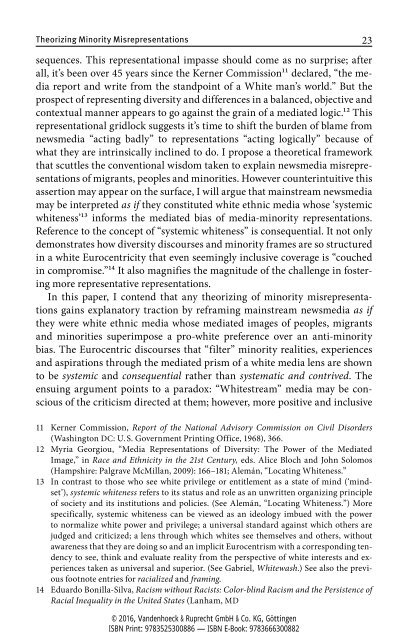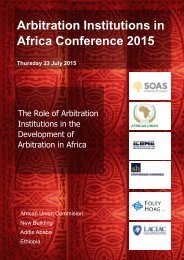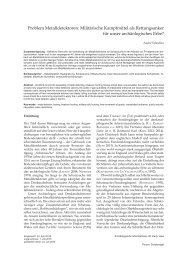Media and Minorities
9783666300882_ruhrmann_media_ebook_034247
9783666300882_ruhrmann_media_ebook_034247
Create successful ePaper yourself
Turn your PDF publications into a flip-book with our unique Google optimized e-Paper software.
Theorizing Minority Misrepresentations 23<br />
sequences. This representational impasse should come as no surprise; after<br />
all, it’s been over 45 years since the Kerner Commission11 declared, “the media<br />
report <strong>and</strong> write from the st<strong>and</strong>point of a White man’s world.” But the<br />
prospect of representing diversity <strong>and</strong> differences in a balanced, objective <strong>and</strong><br />
contextual manner appears to go against the grain of a mediated logic.12 This<br />
representational gridlock suggests it’s time to shift the burden of blame from<br />
newsmedia “acting badly” to representations “acting logically” because of<br />
what they are intrinsically inclined to do. I propose a theoretical framework<br />
that scuttles the conventional wisdom taken to explain newsmedia misrepresentations<br />
of migrants, peoples <strong>and</strong> minorities. However counterintuitive this<br />
assertion may appear on the surface, I will argue that mainstream newsmedia<br />
may be interpreted as if they constituted white ethnic media whose ‘systemic<br />
whiteness’13 informs the mediated bias of media-minority representations.<br />
Reference to the concept of “systemic whiteness” is consequential. It not only<br />
demonstrates how diversity discourses <strong>and</strong> minority frames are so structured<br />
in a white Eurocentricity that even seemingly inclusive coverage is “couched<br />
in compromise.”14 It also magnifies the magnitude of the challenge in fostering<br />
more representative representations.<br />
In this paper, I contend that any theorizing of minority misrepresentations<br />
gains explanatory traction by reframing mainstream newsmedia as if<br />
they were white ethnic media whose mediated images of peoples, migrants<br />
<strong>and</strong> minorities superimpose a pro-white preference over an anti-minority<br />
bias. The Eurocentric discourses that “filter” minority realities, experiences<br />
<strong>and</strong> aspirations through the mediated prism of a white media lens are shown<br />
to be systemic <strong>and</strong> consequential rather than systematic <strong>and</strong> contrived. The<br />
ensuing argument points to a paradox: “Whitestream” media may be conscious<br />
of the criticism directed at them; however, more positive <strong>and</strong> inclusive<br />
11 Kerner Commission, Report of the National Advisory Commission on Civil Disorders<br />
(Washington DC: U. S. Government Printing Office, 1968), 366.<br />
12 Myria Georgiou, “<strong>Media</strong> Representations of Diversity: The Power of the <strong>Media</strong>ted<br />
Image,” in Race <strong>and</strong> Ethnicity in the 21st Century, eds. Alice Bloch <strong>and</strong> John Solomos<br />
(Hampshire: Palgrave McMillan, 2009): 166–181; Alemán, “Locating Whiteness.”<br />
13 In contrast to those who see white privilege or entitlement as a state of mind (‘mindset’),<br />
systemic whiteness refers to its status <strong>and</strong> role as an unwritten organizing principle<br />
of society <strong>and</strong> its institutions <strong>and</strong> policies. (See Alemán, “Locating Whiteness.”) More<br />
specifically, systemic whiteness can be viewed as an ideology imbued with the power<br />
to normalize white power <strong>and</strong> privilege; a universal st<strong>and</strong>ard against which others are<br />
judged <strong>and</strong> criticized; a lens through which whites see themselves <strong>and</strong> others, without<br />
awareness that they are doing so <strong>and</strong> an implicit Eurocentrism with a corresponding tendency<br />
to see, think <strong>and</strong> evaluate reality from the perspective of white interests <strong>and</strong> experiences<br />
taken as universal <strong>and</strong> superior. (See Gabriel, Whitewash.) See also the previous<br />
footnote entries for racialized <strong>and</strong> framing.<br />
14 Eduardo Bonilla-Silva, Racism without Racists: Color-blind Racism <strong>and</strong> the Persistence of<br />
Racial Inequality in the United States (Lanham, MD<br />
© 2016, V<strong>and</strong>enhoeck & Ruprecht GmbH & Co. KG, Göttingen<br />
ISBN Print: 9783525300886 — ISBN E-Book: 9783666300882







